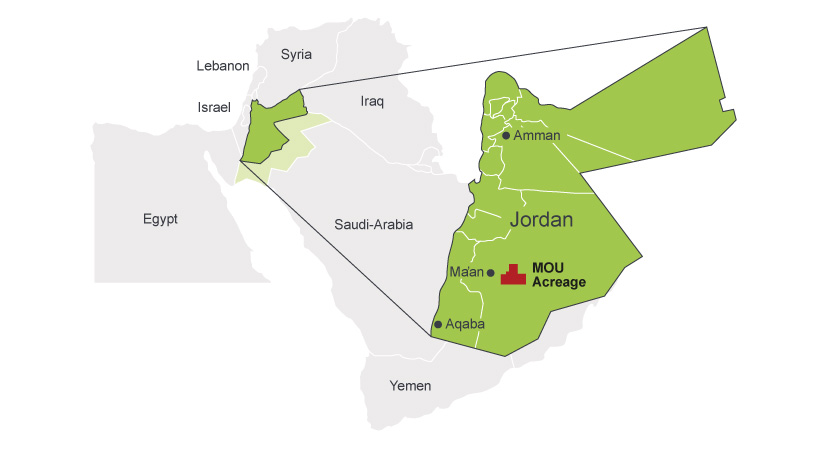Expanding our horizons
We have granted licenses for international projects in the Kingdom of Jordan, Australia and elsewhere
In Jordan, Red Leaf is pursuing a potential small-scale commercial project in Jordan where we have entered into an agreement with an existing licensee and a local company to assess the technology’s potential on Jordanian oil shale. A partnership with Red Leaf to utilize our HCCO® technology could provide Jordan with the ability to realize its oil shale reserves for the long-term.
The first step is to jointly develop a project that would produce between 600 to 1,000 barrels of oil per day with a local partner (the Sultani project). This could then be the stepping-stone to a materially larger project in Jordan (the Isfir-Jafr project), where our technology licensee partner, Questerre Energy Corporation, holds the rights to a multi-billion barrel oil shale resource.
With 8.6 billion barrels of oil, the Isfir-Jafr project can produce up to 400,000 bbl/d for over 40 years.
The project is initially focusing on a smaller scale deposit targeting production of 600 to 1,000 barrels of oil per day in the first phase, with the potential to grow this by adding subsequent phases. We are collaborating with a local partner for the fabrication and construction of the processing facilities. This same partner will purchase the produced oil for use in their industrial operations.
The Sultani project is the first step in developing a multi-billion barrel resource in the country. The intention is to realize the potential of a super-giant oil shale field, the Isfir-Jafr project.
Through a licensing agreement with Questerre Energy Corporation, Red Leaf will participate in the development of the world-class Isfir-Jafr project using its HCCO® technology. With 8.6 billion barrels of oil in-place, the Isfir-Jafr project can support production of up to 400,000 barrels of oil per day for over 40 years. In addition to the oil shale deposit, deeper intervals on the acreage include a formation prospective for carbon sequestration for captured emissions as well as the production of mineable phosphate for fertilizer.
The Isfir-Jafr project benefits from the environmental attributes of the HCCO® process including energy and water self-sufficiency, and capturing and sequestering emissions. The first phase would produce 50,000 barrels of oil per day and include a mining operation, HCCO® processing facilities, and a micro-refinery that would upgrade the oil to Euro-spec gasoline and ultra-low sulfur diesel.
Commercial development of the organic-rich oil shale at Isfir-Jafr would underpin an emerging and groundbreaking industrial complex in the Kingdom. Future plans include the potential to add a fertilizer plant that would utilize the sulfur produced from the HCCO® process, as well as cement produced from another process by-product.
Jordan is an emerging market economy but is heavily dependent on oil imports to fulfill domestic energy demands. Developing its significant oil shale resources could be part of a long-term solution to its energy needs. The Isfir-Jafr project will also make a significant contribution to the Ma’an region and the Kingdom through jobs and economic activity. Lastly, the project benefits from tidewater access less than 160 miles away, enabling any oil in excess of domestic demand to be exported to international markets.

Development plans in Jordan benefit from the Kingdom’s stable and supportive government and regulatory regime. Jordan actively promotes the development of its resources through a supportive, single-window approach where one ministry coordinates approvals from other ministries.